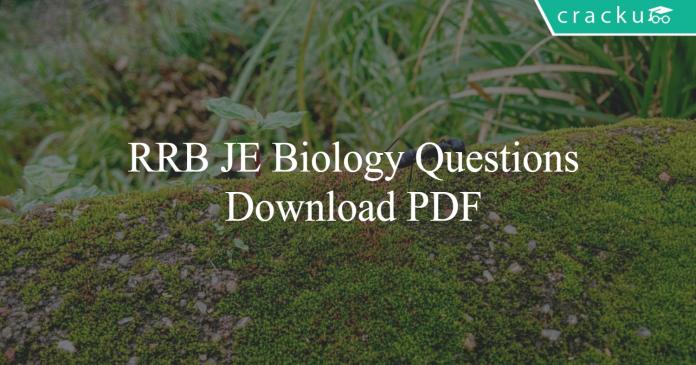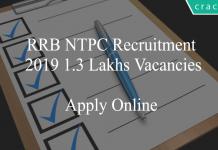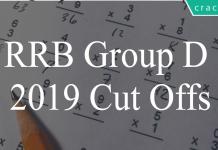RRB J.E Bilogy Questions PDF
Download RRB J.E Biology Questions and Answers PDF. Top 40 RRB JE (Junior Engineer) General Science based on asked questions in previous exam papers very important for the RRB JE exam.
Download RRB JE Biology Questions PDF
10 RRB JE Mocks – Just Rs. 117
RRB JE Previous Papers [Download PDF]
Question 1: Who is the French Biologist known for his discoveries of the Principles of Vaccination and Pasteurization?
a) James Watson
b) Charles Darwin
c) Louis Pasteur
d) Alexander Fleming
Question 2: Which mineral deficiency causes microsis of amla?
a) Calcium
b) Boron
c) Copper
d) Zinc
Question 3: Which part of our body helps in getting the food absorbed?
a) Small Intestine
b) Stomach
c) Pulmonary vein
d) Pulmonary artery
Question 4: Which of the following is an example of carbohydrate?
a) Meat
b) Pork
c) Glycogen
d) Glycine
Question 5: Which of the following disease is sexually transmitted?
a) Colour Blindness
b) Cancer
c) Anemia
d) Alzheimer’s
Question 6: Which membrane is also known as the plasma membrane?
a) Nuclear membrane
b) Nucleolous membrane
c) Tissue membrane
d) Cell membrane
Question 7: What is the virus in which RNA is found as genetic material called?
a) Retrovirus
b) Detrovirus
c) RNAvirus
d) DNAvirus
RRB NTPC Previous Papers Download PDF
Question 8: Which enzyme converts fats into glycerol and fatty acids?
a) Lactase
b) Lipase
c) Sucrase
d) Maltase
Question 9: What is the study of cancer and tumours called?
a) Osteology
b) Oncology
c) Mycology
d) Odontology
Question 10: Which among the following is Exocrine gland?
a) Pituitary Gland
b) Thyroid Gland
c) Salivary Gland
d) Parathyroid Gland
Question 11: Who discovered blood transfer process?
a) Karl Landsteiner
b) Johan E.Salk
c) Alexander Fleming
d) Selman Waksmann
18000+ Questions – Free SSC Study Material
Question 12: Abscisic acid hormone helps in ____?
a) Ripening the fruits
b) Keeping the seeds & bud in dormant condition
c) Cell division & development
d) Turning dwarf plants into long plants
Question 13: What are the plants without seeds called?
a) Cryptogams
b) Phanerogams
c) Gymnosperms
d) Angiosperms
Question 14: What is meant by Phenotype?
a) Genetic constituion of an organism
b) The membrane sorrounding the vacuole
c) Character of an organism that can be seen directly
d) Alternative form of characters governed by a gene
Question 15: What is the fullform of HIV?
a) Humanized Immunodeficiency virus
b) Human infected virus
c) Human Immunity deficiency virus
d) Human immunodeficiency virus
Question 16: Who is called “Father of Taxonomy”?
a) Charles Darwin
b) Carl Linnaeus
c) John Ray
d) Gregor Mendel
Question 17: Match the following:

a) I – 2, II – 3, III – 1
b) I – 1, II – 3, III – 2
c) I – 2, II – 1, III – 3
d) I – 3, II – 2, III – 1
Question 18: The process of making food in a plant is called as photosynthesis and it is stored in the form of?
a) Maltose
b) Sucrose
c) Starch
d) All of the above
Question 19: Organ that helps to prevent the entering of swallowed food into lungs is?
a) Aorta
b) Spleen
c) Epiglottis
d) Pharynx
Question 20: Kidney in a human body is made up of nearly million narrow tube like structures called as?
a) Masseter
b) Nephrons
c) Stapedius
d) Aorta
Question 21: Which of the following is a root?
a) Tomato
b) Potato
c) radish
d) Avocado
Daily Free Online Tests for RRB Exams
Question 22: Which of the following Gland is located in a bone cavity called sella tursica?
a) Pancreas
b) Thyroid Gland
c) Adrenal Gland
d) Pituitary Gland
Question 23: Cells of Organisms which have no defined Nucleus is called?
a) Prokaryotes
b) Cell Membranes
c) Eukaryotes
d) None of these
Question 24: The total number of Autosomes present in a human body is?
a) 40
b) 46
c) 44
d) 54
Question 25: _____________ is a mixture of Electrons and ions and is the most common physical state of matter in the universe?
a) Solid
b) Atom
c) Plasma
d) Liquid
Question 26: Which among the following helps in the transport of water in Plants?
a) Thylakoids
b) Xylem
c) Chloroplast
d) Stroma
Question 27: What is the percentage of Oxygen present in a Human body?
a) 10
b) 18
c) 50
d) 65
Question 28: Penicillin was discovered by?
a) Alexandar Fleming
b) Jonas Salk
c) Ernst Chain
d) Charles Darwin
Question 29: Foot and Mouth Disease in animals is caused by which of the following Micro-Organisms?
a) Bacteria
b) Fungi
c) Virus
d) Protozoan
Question 30: The Oxygen from lungs enter the blood through which of the following?
a) Duodenum
b) Alveoli
c) Arteries
d) Veins
Question 31: Which of the following compounds is generally used to Preserve Blood?
a) Calcium Hydroxide
b) Potassium Hydroxide
c) Sodium Citrate
d) Potassium Nitrate
Question 32: Which of the following type of Blood Cells are don’t contain Nuclei?
a) Platelets
b) Red Blood Cells
c) White Blood Cells
d) None of these
Question 33: Which of the following Hormones is generally used in medicine to treat Hypogylcemia or Low Blood Sugar?
a) Insulin
b) Glucagen
c) Irisin
d) Prolactin
Question 34: Pulmonary Veins carry blood between which of the following Organs of the Body?
a) Heart to Lungs
b) Brain to Lungs
c) Heart to Brain
d) Lungs to Heart
Question 35: Cardiology is the study of?
a) Skin
b) Heart
c) Joints
d) Aging
Question 36: Food cans are coated with tin rather than Zinc,this is because?
a) Zinc is costlier than Tin
b) Tin is costlier than Zinc
c) Zinc is more reactive than Tin
d) Tin is more reactive than Tin
Question 37: _____________is a process of Movement of substance from high concentration to low concentration region
a) Diffraction
b) Repulsion
c) Both a and d
d) Diffusion
Question 38: Smallest cell in human body is?
a) female ovum
b) Red blood cells
c) Nerve cells
d) white blood cells
Question 39: Bowman’s Capsule is found in which of the following Parts of the Body that performs the first step of filtration of Blood?
a) Liver
b) Lungs
c) Kidney
d) Heart
Question 40: Which of the following Doctors has conducted the first Successful Blood Transfusion?
a) Richard Lower
b) William Harvey
c) James Bludell
d) Albert Hustin
General Science Notes for RRB Exams (PDF)
Answers & Solutions:
1) Answer (C)
2) Answer (B)
3) Answer (A)
Small Intestine helps in getting the food absorbed back into the body.
4) Answer (C)
Glycogen, Maltose, fructose, other sugars are examples of carbohydrates.
5) Answer (A)
Colour Blindness can be transmitted sexually.
6) Answer (D)
7) Answer (A)
8) Answer (B)
9) Answer (B)
10) Answer (C)
11) Answer (A)
12) Answer (B)
13) Answer (A)
14) Answer (C)
15) Answer (D)
16) Answer (B)
17) Answer (A)
18) Answer (C)
19) Answer (C)
20) Answer (B)
21) Answer (C)
22) Answer (D)
23) Answer (D)
24) Answer (C)
25) Answer (C)
26) Answer (B)
27) Answer (D)
28) Answer (A)
29) Answer (C)
30) Answer (B)
31) Answer (C)
32) Answer (A)
33) Answer (B)
34) Answer (D)
35) Answer (B)
36) Answer (C)
37) Answer (D)
38) Answer (B)
39) Answer (C)
40) Answer (C)
DOWNLOAD APP FOR RRB FREE MOCKS
We hope this Biology Questions for RRB JE Exam will be highly useful for your preparation.





